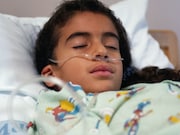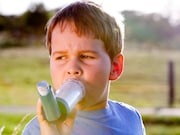Tag: Kids: Misc.
Core Language Skill Stable From Infancy to Adolescence
Consistency in core language skill is stable through childhood in typically, atypically developing children
Results of Pediatric Genomic Epilepsy Tests Often Reclassified
Over 30 percent of pediatric patients with genetic dx, undiagnosed conditions had results reclassified
Case Description Can Reliably Define Acute Flaccid Myelitis
Differences between patients with AFM, other diagnoses include asymmetry of weakness
Liquid Biopsy Can Assess Tx Response of Peds Brain Tumors
Study is the first to document the utility of liquid biopsy in a pediatric brain tumor population
Amblyopia Linked to Lower Self-Perception in Children
Lower perception of scholastic, social, athletic competence could affect reading, motor skills
Large at Birth, Maternal Diabetes Up Child’s Risk for Obesity
Breastfeeding lowers risk in those large for gestational age, but only without maternal diabetes
Less Pediatric Screen Time Tied to Better Well-Being
High users of screens more likely to have history of depression, anxiety, mental health tx
Prevalence of Eating Disorders 1.4 Percent in Preteens
No statistically significant differences in prevalence rates seen between boys and girls
USPSTF: Evidence Lacking for Prevention of Child Maltreatment
Evidence inadequate to weigh benefits, harms of interventions for preventing maltreatment
Child Overweight, Obesity Linked to Increased Asthma Risk
In absence of overweight and obesity, 10 percent of all pediatric asthma cases would be avoided














